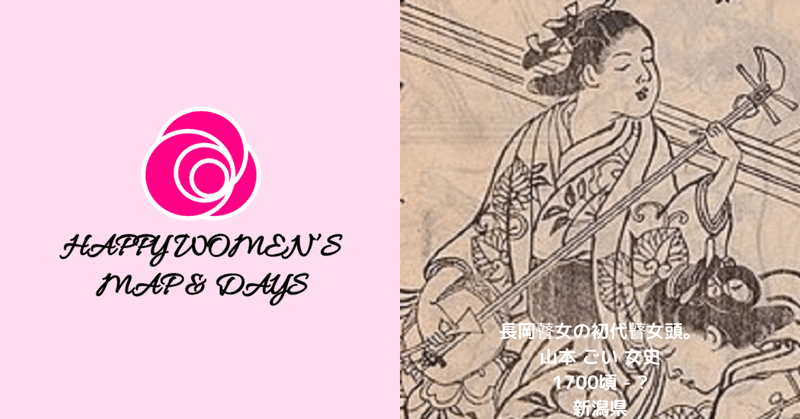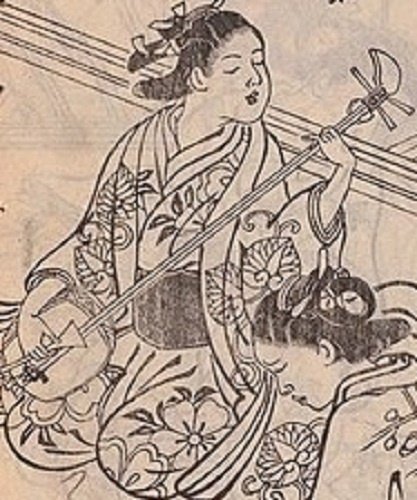
Happy Women's Map 新潟県 長岡瞽女の元祖 山本 ごい 女史

山本 ごい 女史
Ms. Goi Yamamoto
1700頃 - ?
新潟県長岡市 生誕
Born in Nagaoka-city, Niigata-ken
山本ごい女史は長岡地方の瞽女頭となって、格式と規律を重んじる瞽女集団を統率、江戸から明治にかけての長岡瞽女の繁栄の基礎を築きました。
Ms. Gozen Yamamoto became the leader of the blind female performers in the Nagaoka region, guiding a group of blind performers who upheld formality and discipline. She laid the foundation for the prosperity of blind female performers in Nagaoka during the transition from the Edo period to the Meiji era.
*******
山本ごいは長岡藩主・牧野氏の息女、照姫として生まれます。生まれつき目が不自由だったため、生まれを隠して家老の山本家へ養女に出されます。成長したのちに牧野家から土地と扶持米を給せられて長岡の柳原町へ分家、牧野家ゆかりの地域の古志・三島・刈羽・魚沼・頸城五郡内などの瞽女頭となって格式と規律を重んじる瞽女集団を統率していきます。通称を「山本ゴイ」と定め、その後の代々の山本ゴイは長岡系の多数の瞽女の中から、全盲で品行端正の老齢者が選ばれ受け継がれます。「山本ゴイ」を頂点に親方資格を得た師匠が自宅で弟子を取るという、茶道や華道に見られる家元制度をが作り上げられます。瞽女の弟子入り修業は年期制で二十一年、男子禁制・化粧またおしゃれ厳禁・年功序列などの制約また掟があり、違反すると年期を戻されたり仲間から外されます。説経系・祭文系・心中物・情事物・滑稽物・風刺物・唱導物・義太夫・長唄・端唄・常磐津・清元・新内・各種のはやり唄・民謡・万歳・門付け唄など、お客に所望されて何でも歌えるよう師匠から厳しく唄の稽古をつけられます。瞽女の主な稼業は「門付け」で、目明きの手引きに先導され列をなして村々町々を渡り歩き、昼は民家の戸口戸口に立って唄を歌って米銭を乞い、夜は泊まり宿で近所の人たちを相手に好みの唄を披露して代償を得ます。瞽女の巡業地また瞽女宿は先祖師匠から開拓された数十年来の縁故をもち、甲信の一部から関東一円・東北の福島・山形・秋田・宮城まで及びます。特に農村地方では瞽女に対する民間信仰が篤く、瞽女は安産・子育て・治病・生業増産の信仰の対象として大切にもてなされます。瞽女は人々に・綿の種に・麦の種に・蚕棚の蚕に向かって唄い、もてなす人々は瞽女のもらい集めた米を煮て食べたり、瞽女の着物をもらって着たり、瞽女の使い古した三味線糸を結びつけてお守りにしたり、薬にして飲んだりします。
Gozen Yamamoto was born as the daughter of the lord of Nagaoka, the Makino family, under the name Teruhime. She was born with visual impairment, so she was given up for adoption to the Yamamoto family, who were retainers. After growing up, she received land and a stipend of rice from the Makino family and established a branch in Yanagihara-cho, Nagaoka, in areas related to the Makino family, such as old shi, Mishima, Kariba, Uonuma, and Koshiji Go. She led a group of blind female performers who upheld formality and discipline. She was commonly known as "Gozen Yamamoto," and subsequently, each generation of Gozen Yamamoto was chosen from among a large number of blind female performers from the Nagaoka line. They were selected based on being completely blind and having impeccable conduct in their old age. This system established a family head system similar to that seen in tea ceremony and flower arrangement, with masters obtaining the title of "Gozen Yamamoto" and taking on disciples at home. Becoming a disciple of a blind female performer involved a training period of twenty-one years. There were various constraints and rules, such as a ban on male performers, strict rules against makeup and fashionable clothing, and a seniority system. Violating these rules could result in having to start the training period over or being ostracized by peers. They were rigorously trained by their masters to sing various types of songs, including narrative songs, festival songs, tragic love stories, comical songs, satirical songs, guidance songs, gidayu, nagauta, hashiuta, Tokiwazu, Kiyomoto, Shin-Uchi, and various popular songs, folk songs, manzai, mon-tsuke-uta, and more. They had to be able to sing whatever the customers desired. The primary occupation of blind female performers was "mon-tsuke," in which they would be led by a sighted guide to go from house to house in villages and towns, singing songs at each doorstep, begging for rice and money during the day. At night, they would perform their preferred songs at lodging houses for the locals and receive compensation. The touring locations for blind female performers and the inns where they stayed were established through connections passed down from their ancestors and masters. Especially in rural areas, there was a strong folk belief in blind female performers, who were highly regarded as objects of faith for safe childbirth, child-rearing, healing, and increasing one's livelihood. Blind female performers sang songs directed towards people, cotton seeds, wheat seeds, and silkworms in their silkworm beds. Those who received them would cook the rice collected by blind female performers, wear their clothing, use their discarded shamisen strings as amulets, or even consume them as medicine.
-新潟県立歴史博物館 Niigata History Museum
-新潟日報 Niigata News

Share Your Love and Happy Women's Story!
あなたを元気にする女性の逸話をお寄せください!
Share your story of a woman that inspires you!
この記事が気に入ったらサポートをしてみませんか?
